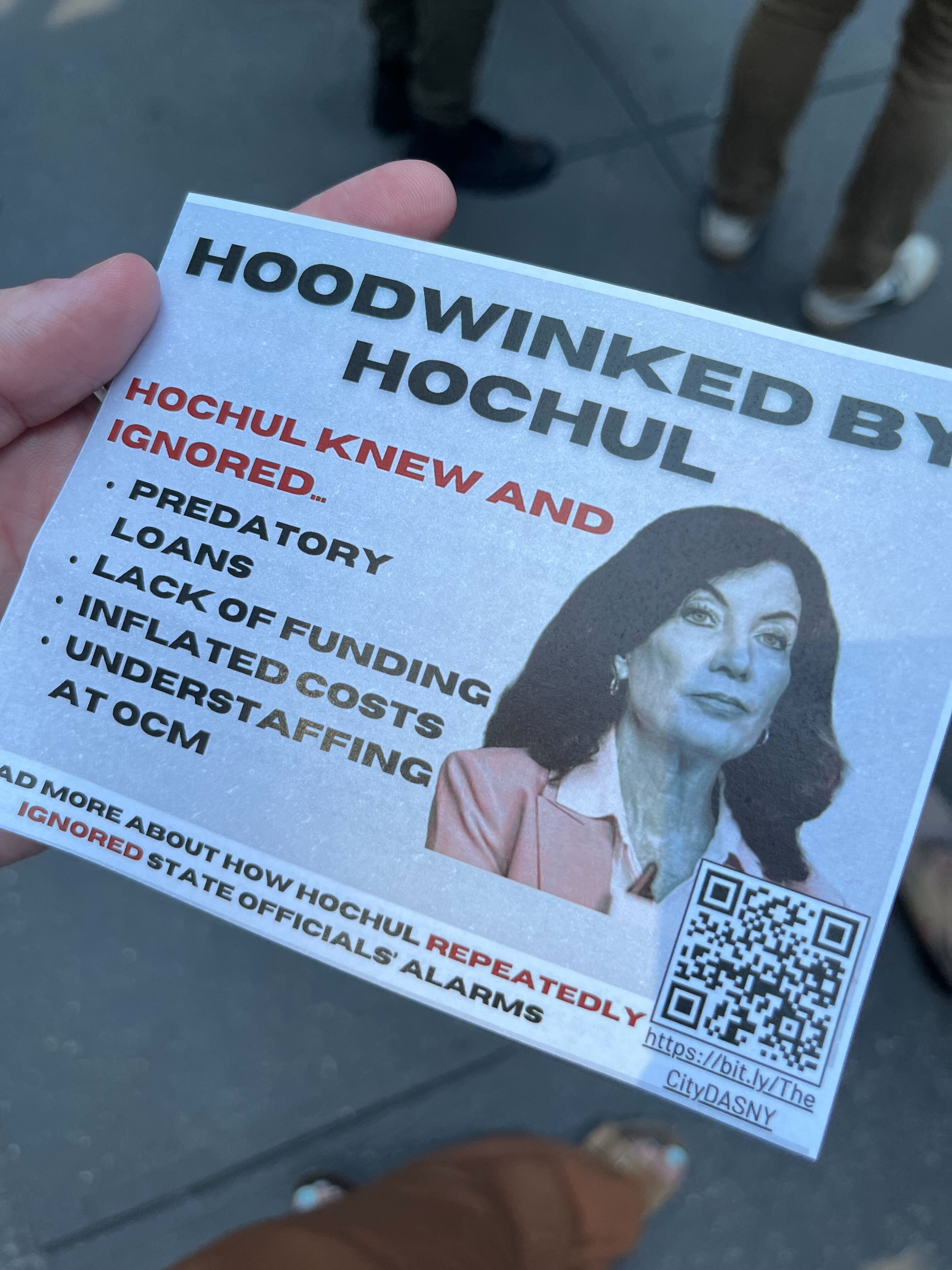Gov. Kathy Hochul came to Manhattan Tuesday morning to declare a reboot for New York’s rocky retail cannabis industry — even as frustrated applicants for retail licenses protested in front of her office over the state’s broken promises to let them launch their businesses.
At John Jay College on Midtown’s west side, Hochul told the crowd: “New York State is rapidly building the most expansive, equitable cannabis market in the nation. One that uplifts Black and brown New Yorkers who have been victimized by the war on drugs.”
She announced that in the first month of enforcement enabled by a new state law, authorities had padlocked 114 unlicensed stores and seized $30 million in products, adding that the state aims to close the majority of unlicensed shops within 90 days.
Sales at legal cannabis shops are up 27% in the month, she said. “It’s a new era for the cannabis industry right here in the State of New York,” Hochul said.
Meanwhile, a crowd of several dozen protesters gathered outside of Hochul’s Midtown East city office, bearing handouts that read “Hoodwinked by Hochul” and a link to THE CITY’s investigative report showing that the Hochul administration launched a high-interest “social equity” loan program for startups despite objections from staff at her own Office of Cannabis Management.
“People said the loans that they were pushing out were predatory. They said they were a problem. Hochul did nothing,” Public Advocate Jumaane Williams told the rally.
The state had promised to prioritize retail licenses for people who had been affected by drug convictions under years of cannabis prohibition that disproportionately affected people of color. Applicants were informed that the first 150 retail licensees would be offered ready-to-open dispensaries via the state Dormitory Authority (DASNY) and could pay back construction costs through a low-interest loan from a public-private cannabis fund to which the state contributed $50 million.
Internal emails obtained by the THE CITY showed Office of Cannabis Management officials repeatedly warned Hochul’s office about the inflated costs of loans that the cannabis fund was offering retail licensees under the $150 million financing deal that the investment fund signed with Chicago Atlantic Group, a private equity fund based in Illinois.
In January, with few licenses issued, Hochul called the legal cannabis launch “a disaster,” and proceeded to order a review of the state cannabis agency. The resulting report blamed inexperienced leadership and inefficiency for the bottleneck. Hochul asked agency head Chris Alexander to step down at the end of his term. Two weeks later, Alexander submitted his resignation.
‘DASNY Is the Disaster’
Between speakers, the crowd chanted “Hochul Hochul, if you sell out, then you will have to get the hell out” in call and response. One demonstrator held up a sign that read: “Hey Hochul, DASNY is the disaster.”
Jessica Naissant, who was awarded a retail license last July, told THE CITY that she was offered some of the fund-supported dispensary locations that came with steep loans. But when she reviewed the details, including high construction costs and strict repayment terms, she knew it was a bad deal, she said.
“It’s just been so difficult being offered these DASNY loans that are essentially predatory,” said Naissant. “Once you read those loans, you’ll see you’re pretty much locked in for life to pay them off.” Citing construction costs of a half a million dollars for even a small location and a high interest rate, she said signing on was an untenable option: “It was honestly ridiculous.”

After dismissing the loans from the fund, Naissant instead raised money from friends and family and is opening a dispensary in Chelsea called Renaissance.
Jessica Fernandez doesn’t have a license yet. She applied in the general application pool last December. But Hochul’s recent decision to review every person who applied in the November queue has her worried that her application will never be reviewed at all. November applicants had to prove they already leased or owned a location to qualify.
The decision to prioritize November applicants over December applicants, she told THE CITY, is “really about prioritizing folks that are really capitalized and have the real estate already. Those are not social equity applicants,” Fernandez said. New York’s 2021 cannabis law outlined that half of licenses awarded should go to people from underrepresented groups such as women and veterans, as well as people harmed by past drug laws.
Fernando Lendof said that after receiving his license in April 2023, he still hasn’t been able to get close to opening a dispensary. Lenoff, too, was offered a few different locations from the social equity fund. He was in talks to get one in SoHo, which another licensee opened as Elevate SoHo earlier this year.
“We were promised something was basically a turnkey operation, which is the only reason I signed up for this,” Lendof said in an interview with THE CITY.
The retail dispensary program was halted for a few months by a court order last August after veterans sued alleging they were not given priority for licenses at the same time as people harmed by past drug convictions. A settlement finally came in November, but by then the fund had stopped communicating with him, said Lendolf. “After the injunction, it went dry, I’ve never heard from the fund again.”
Lendof says he hasn’t amassed the capital to find his own dispensary location and open on his own.
“I’m at a stalemate now.”

